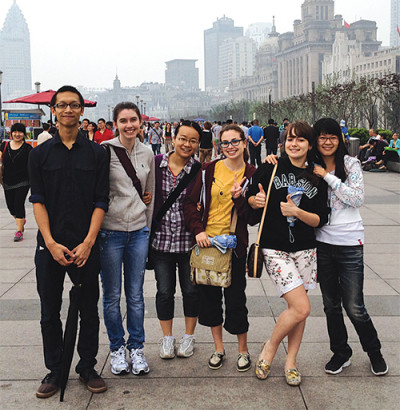
From left, Michael Ninh ’15, Molly Ronan ’16, Qin Na (Tongji University), Amelie Bushong ’16, Roxelane Wagner ’16, and Xue Mei (Tongji University) at The Bund in Shanghai
Study Chinese in a Babson classroom for three weeks, then hop on a plane to visit Shanghai for 10 days to practice what you learned. That is how a group of first- and second-year students spent the beginning of their summer when they took “Chinese Language and Culture for Global Professionals.”
A new offering, the course was designed in part to expose students to global experiences and language earlier in their academic lives. “Because we have such a packed curriculum, it can be hard to fit in language or study abroad before your junior year,” says Jenny Rademacher, assistant professor of Spanish and director of the language program. “But if you want to do something global, you should be thinking about it earlier and with more intentionality. So we thought about how we could encourage that.”
Weina Zhao, senior lecturer in Chinese language at Babson and Wellesley College, developed the course, focusing on language typically used in business settings. Combining classroom study with a trip to Shanghai made sense to her. “To be honest, you need an understanding of language and culture with Chinese,” she says. “If you don’t understand both, you will have problems. China is more Westernized now, but there are still some differences.” She gives a few simple examples: “In China, when you say, ‘Oh, your English is so good,’ Chinese people will say, ‘No, no, it’s just so-so.’ It shows they’re modest. American students say, ‘Thank you.’ Or if you attend a business banquet in China, you cannot pick any seat. The seat facing the door is for the VIP.”
While at Babson, students focused mainly on writing and pronunciation, although Zhao would add conversational snippets to lighten the intense study. After taking a written exam, they left for Shanghai to practice their language skills. Two Chinese students from Babson- partner Tongji University attended classes to help Babson students. The Tongji students also came on excursions, which the group took every afternoon, to places such as the World Financial Center and The Bund, a historical, walking section of the city on the waterfront. Students had plenty of time to explore on their own as well. The trip ended with an oral exam.
Molly Ronan ’16 had been to Beijing with her family before taking the course; she wanted to visit the more modernized Shanghai. “The hardest part was speaking to order lunch and dinner, because we were on our own a lot for that,” she says. “A lot of times we’d go with our Chinese tutors, so they’d help us.” An interest in pursuing international business after graduation influenced her decision to take the course. “Knowing Chinese would help me immensely,” she says.
Amelie Bushong ’16 already had been to China as well and had studied conversational Chinese, but she was still intrigued by the summer course. Travel abroad the end of first year? “That does not happen,” she thought. She enjoyed the experience, from learning traditional Chinese writing to exploring the old and new sections of Shanghai to bargaining with Chinese vendors to eating dumplings and rice for breakfast. Bushong also is interested in studying international business. “We learned a lot—it was a lot of cramming,” she says, “but it was really impressive.”—Donna Coco
